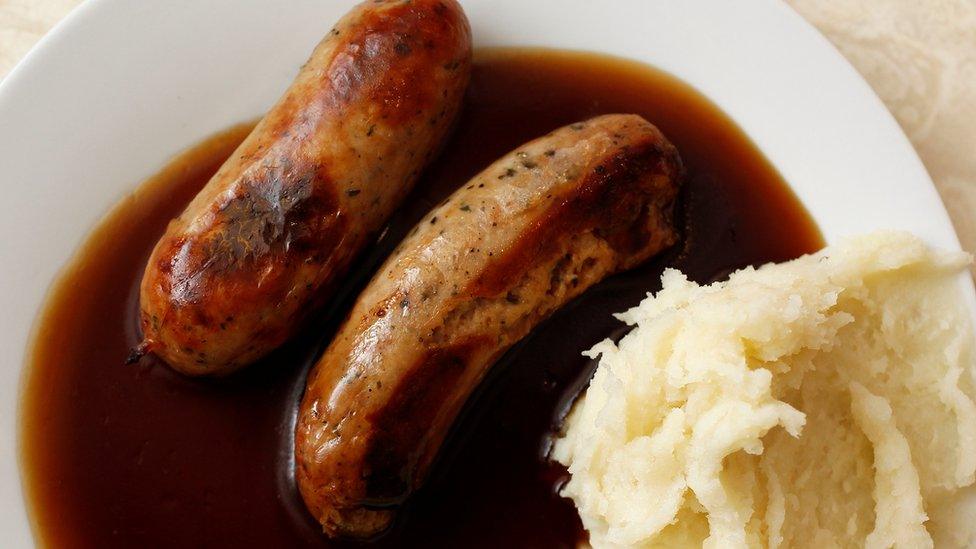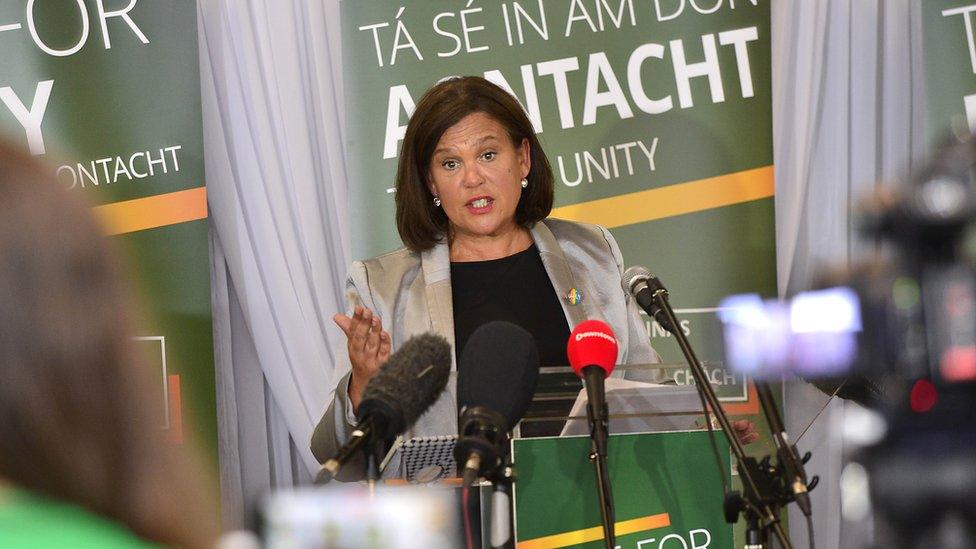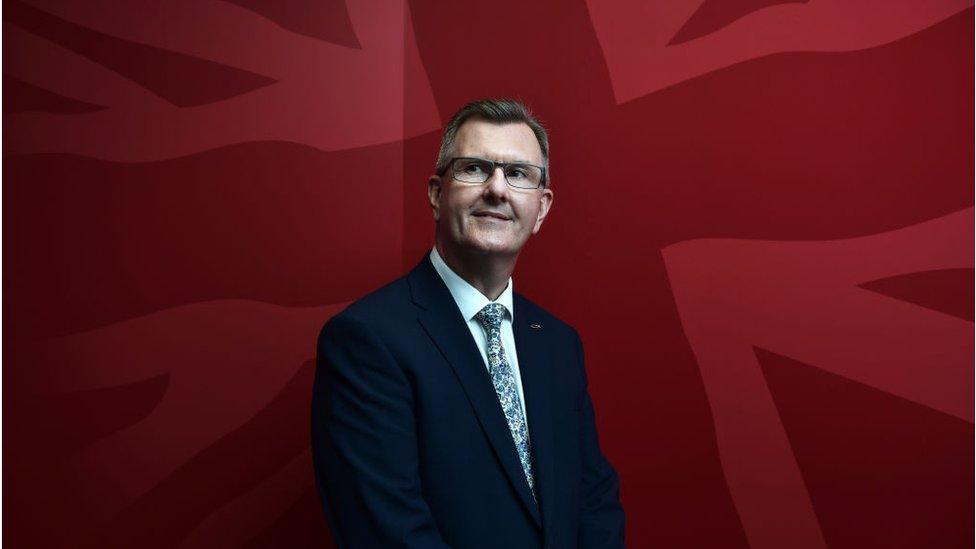Brexit: EU set to agree delay to NI Protocol meat ban
- Published

A ban on chilled meats such as sausages moving from GB to NI could take effect from next week
The EU is set to agree to a UK request to delay a ban on chilled meat products from Great Britain being sold in NI.
Products such as chilled sausages were due to be prohibited from Tuesday as a consequence of the post-Brexit Northern Ireland Protocol arrangement.
The European Commission has recommended a delay should be allowed.
However, the EU said it wanted further discussions with the UK before confirming the delay.
Sinn Féin leader Mary Lou McDonald has warned it would be a "huge error" for the Democratic Unionist Party (DUP) to collapse Northern Ireland power sharing over the controversial protocol.
It has been criticised by unionists for causing additional checks on some trade between Great Britain and Northern Ireland.
The Northern Ireland Protocol was designed as part of the Brexit deal to keep Northern Ireland closely aligned with this market, ensuring free trade across the Irish border.
The EU normally bars chilled meat products from being imported into its single market.

Mary Lou McDonald said talk of the protocol being abolished was not "grounded in reality"
Last week, the UK asked the EU for more time as a six-month grace period on the ban on chilled meat was due to expire.
Irish broadcaster RTÉ reported the conditions of the extension would be the UK agreeing to align with relevant EU food safety rules for its duration and further discussions about a long-term solution for Great Britain to NI food movements.
'Maximise opportunities of protocol'
During a speech to Sinn Féin activists at a hotel in Belfast on Wednesday, Ms McDonald said talk of the protocol being abolished was "not grounded in reality".
"We need the protocol because Brexit is bad news for Ireland and bad news for the north in particular," she said.
"The DUP need to work alongside the rest of us to meet the challenges and maximise the opportunities of the Irish protocol."

Sir Jeffrey Donaldson spoke to Ms McDonald on Tuesday, with the pair set to meet next week
DUP leader-designate Sir Jeffrey Donaldson wants the protocol to be removed.
"We don't agree with the DUP on Brexit - I hate to say 'we told you so' but we did say at the time that Brexit would be dangerous and disruptive," said the Sinn Féin president.
Ms McDonald said she spoke to Sir Jeffrey on Tuesday where they arranged a meeting for next week.
"It would be a huge error for anyone, but for the DUP in particular, to attempt to pull down power-sharing on the basis of political posturing around the protocol.
"Whether we can change their minds or not, well, you can take the odds and the bets on that."
Outgoing DUP leader Edwin Poots has said he was assured by the UK government that there would be movement on the protocol, perhaps in early July.


Today's speech was essentially Sinn Féin laying down a marker to the DUP.
The words from Mary Lou McDonald were aimed directly at Sir Jeffrey Donaldson as he prepares to take on the DUP leadership.
The Sinn Féin president posed a series of challenges and essentially wanted to know if the DUP were willing to be partners at Stormont and fully committed to power sharing.
Her strongest warning came regarding the future of devolution and she said any attempt to collapse the institutions over Brexit would be "a huge error".
There was also a warning that previous commitments must be honoured, and on the issue of Irish language legislation, she said the matter was now "concluded".
On the protocol, she reiterated Sinn Féin's position that it is here to stay, but she did welcome news that changes to the EU meat ban could happen.
She said when people engage in good faith "solutions can be found".
This was essentially Mary Lou McDonald having a public conversation with the incoming DUP leader. Next week they will meet in person.

On Wednesday, Northern Ireland Secretary Brandon Lewis told a Westminster committee that the government was "optimistic and confident" that changes will be made to the protocol.
He described the current situation as "unsustainable".
Mr Lewis said the UK was awaiting a response from the EU on a request to extend grace periods for chilled meats.
He also said he would discuss the matter with the Irish government at a high-level joint summit in Dublin on Thursday.
Taoiseach (Irish prime minister) Micheál Martin said there are mechanisms to deal with trade and co-operation difficulties and space should be given on the issues that matter.
He told the Dáil (lower house of parliament) that opportunities provided by the protocol should be identified in areas such as foreign direct investment and for the dairy sector.
Mr Martin said he believed people in Northern Ireland were more concerned with "bread and butter issues" as opposed to constitutional matters.

Sir Jeffrey said he wanted to speak to the prime minister as soon as possible, warning that it would not be realistic to expect stability at Stormont "when every unionist representative in the devolved institutions opposes the Northern Ireland Protocol".
"The government and those who claim to be protectors of peace and stability must step up and deal with the protocol in a manner which respects the constitutional and economic integrity of the United Kingdom," he said.
'Be honest'
Earlier on Wednesday, Sinn Féin MP Chris Hazzard said many businesses had benefited from the protocol and he urged the DUP to "be honest" with its party members and the public.
Sir Jeffrey, who was the only candidate for the DUP leadership when nominations closed, will be "judged by his actions and not by his word", said Mr Hazzard, the MP for South Down.
Sinn Féin has called for the full implementation of the New Decade, New Approach (NDNA) agreement, external which restored Stormont in 2020.
This deal restored power-sharing in January 2020 after a three-year hiatus.
It contained provisions for the Irish language and Ulster-Scots culture, including new commissioners to promote both, but this has yet to be legislated on in the assembly.
NDNA also included commitments on issues such as health, the legacy of the Troubles in Northern Ireland and introducing UK-wide legislation to further incorporate the Armed Forces Covenant into law.
The Northern Ireland secretary said Westminster would introduce legislation to implement NDNA if Stormont had failed to do so by October.
That row contributed to the downfall of Mr Poots as DUP leader - last week he announced he would resign after 21 days in the position.
- Published2 February 2024

- Published22 June 2021

- Published23 June 2021